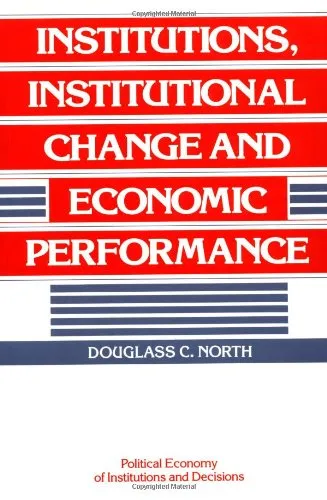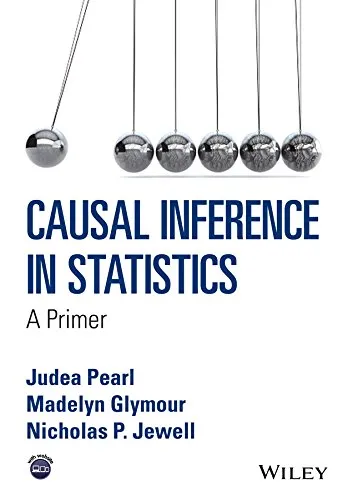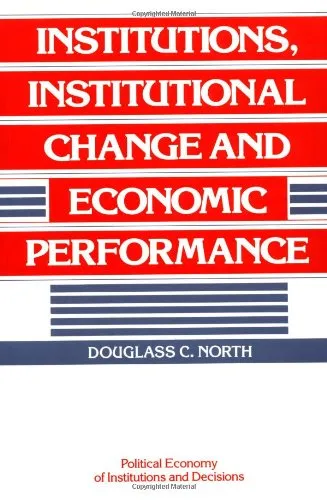Institutions, Institutional Change and Economic Performance
4.5
بر اساس نظر کاربران

شما میتونید سوالاتتون در باره کتاب رو از هوش مصنوعیش بعد از ورود بپرسید
هر دانلود یا پرسش از هوش مصنوعی 2 امتیاز لازم دارد، برای بدست آوردن امتیاز رایگان، به صفحه ی راهنمای امتیازات سر بزنید و یک سری کار ارزشمند انجام بدینکتاب های مرتبط:
معرفی کتاب "Institutions, Institutional Change and Economic Performance"
کتاب "Institutions, Institutional Change and Economic Performance" یکی از آثار برجسته در حوزه اقتصاد و تحلیل نهادی است. این کتاب توسط من، داگلاس نورث، نوشته شده است و هدفش شفافسازی نقش نهادها در توسعه اقتصادی، تغییرات نهادی و عملکرد اقتصادی جوامع مختلف در طول تاریخ است. این اثر پاسخی مستدل به این پرسش است که چرا برخی جوامع رشد و پیشرفت اقتصادی پایداری دارند، درحالیکه دیگران به سمت رکود یا سقوط میروند.
خلاصهای از کتاب
در این کتاب، تمرکز اصلی بر مفهوم "institutions" یا نهادها است. نهادها به طور کلی قواعد، هنجارها و ساختارهایی هستند که تعاملات انسانی را شکل میدهند. این نهادها میتوانند رسمی (مانند قوانین دولتی) یا غیررسمی (مانند فرهنگی و رسوم محلی) باشند. کتاب بررسی میکند که چگونه این نهادها ظهور میکنند، تغییر مییابند و چگونه بر تصمیمات اقتصادی تأثیر میگذارند.
من در این اثر به بررسی دلایل موفقیت و شکست نظامهای اقتصادی پرداختهام. یکی از ایدههای کلیدی این است که اقتصادهای موفق دارای نهادهایی هستند که شرایطی برای کاهش هزینههای مبادله و افزایش کارایی فراهم میآورند. اما، تغییر نهادی اغلب دشوار است و تحت تأثیر عواملی چون تاریخ، سیاست و تضاد منافع قرار دارد.
در مجموع، کتاب نشان میدهد که رشد اقتصادی نه فقط به تکنولوژی یا سرمایه، بلکه به نهادهای پشتیبان آنها وابسته است. تحول نهادی نیازمند بستر مناسب سیاسی، اجتماعی و اقتصادی است که در طول تاریخ توسعه یابد.
نکات کلیدی
- نهادها هزینه مبادله را کاهش داده و کارایی اقتصادی را افزایش میدهند.
- تغییرات نهادی تحت تأثیر گذشته تاریخی (path dependency) قرار دارد.
- تغییر نهادی فرآیندی تدریجی و زمانبر است که به توسعه سیاسی و اجتماعی همراستا نیاز دارد.
- توسعه اقتصادی بدون توسعه نهادهای مناسب و کارکردی پایدار نخواهد بود.
جملات معروف از کتاب
“Institutions are the humanly devised constraints that structure human interaction. They are made up of formal constraints (e.g., rules, laws, constitutions), informal constraints (e.g., norms of behavior, conventions), and their enforcement characteristics.”
“The major role of institutions in a society is to reduce uncertainty by establishing a stable (but not necessarily efficient) structure to human interaction.”
چرا این کتاب اهمیت دارد؟
اهمیت این کتاب در نگاه چندبُعدی آن به موضوع اقتصاد است. برخلاف رویکردهای سنتی که تمرکز اصلی را بر سرمایه، منابع طبیعی یا نیروی کار قرار میدهند، این کتاب به "نهادها" بهعنوان مبنای اصلی توسعه اقتصادی میپردازد. نورث نشان میدهد که توسعه پایدار بدون ایجاد و بهبود نهادهای مناسب اقتصادی، سیاسی و اجتماعی ممکن نیست.
همچنان که جوامع به دنبال یافتن مسیرهای جدید برای مقابله با چالشهای اقتصادی و اجتماعی قرن ۲۱ هستند، کتاب "Institutions, Institutional Change and Economic Performance" بهعنوان یک راهنمای ارزشمند برای سیاستگذاران، پژوهشگران و علاقهمندان به توسعه و اقتصاد عمل میکند.
Introduction to "Institutions, Institutional Change, and Economic Performance"
Written by the Nobel Prize-winning economist Douglass C. North, "Institutions, Institutional Change, and Economic Performance" is a groundbreaking exploration of the role institutions play in shaping economic outcomes. First published in 1990, this seminal work establishes a firm foundation for understanding how rules, norms, and organizations—referred to collectively as institutions—structure economic, political, and social interactions. Through its rich analysis, the book seeks to answer a pivotal question in economics: why do some economies develop and perform well, while others stagnate or regress over time?
North argues that institutions are the key to unlocking long-term growth and prosperity. By influencing the incentives and constraints that shape human behavior, institutions determine whether cooperation or conflict, innovation or stagnation, will dominate an economy. This book integrates insights from economics, history, political science, and sociology into a cohesive framework for understanding how formal rules and informal norms evolve, why some persist, and how they impact economic performance over centuries. Its analytical framework reshapes our understanding of economic development, providing a powerful toolset for policymakers, economists, and historians.
Detailed Summary of the Book
"Institutions, Institutional Change and Economic Performance" is organized into three core sections. First, North defines what institutions are and how they serve as both the "rules of the game" and the constraints within which economic actors operate. He distinguishes between formal institutions, such as laws and constitutions, and informal institutions, such as customs, traditions, and codes of conduct. These institutions shape the costs and benefits of economic activity, influencing how resources are allocated and how economies perform.
The second section delves into the dynamics of institutional change. North postulates that institutional evolution is driven by a combination of intentional design and unintended consequences. While political and economic elites often establish institutions to protect their interests, these institutions may adapt as individuals and groups respond to new challenges and opportunities. The author emphasizes that the process of institutional change tends to be incremental, path-dependent, and uneven, as it reflects the historical context in which organizations and individuals operate.
In the final section, North examines the long-term relationship between institutions and economic performance. He argues that successful economies are those whose institutions reduce transaction costs, provide incentives for innovation, secure property rights, and encourage cooperation. Conversely, extractive or inefficient institutions can trap societies in cycles of poverty, corruption, and underdevelopment. Using historical case studies, North illustrates how institutional frameworks have played a decisive role in the economic trajectories of nations, from medieval times to the modern era.
Key Takeaways
- Institutions are the "rules of the game," and they shape economic incentives, behavior, and outcomes.
- Both formal rules (laws, constitutions) and informal norms (culture, social conventions) are crucial in structuring economic interactions.
- Institutional change often occurs incrementally and is shaped by history, making it path-dependent and context-specific.
- The effectiveness of institutions determines the level of transaction costs and the security of property rights, which in turn drive economic growth or stagnation.
- Societies with inclusive institutions that promote cooperation, innovation, and property rights are more likely to experience sustainable long-term growth.
Famous Quotes from the Book
"Institutions are the humanly devised constraints that structure political, economic, and social interaction."
"It is the composite of formal rules, informal norms, and enforcement characteristics that together shape human behavior."
"The inability of societies to develop effective, low-cost enforcement of contracts is the most important source of both historical stagnation and contemporary underdevelopment."
Why This Book Matters
"Institutions, Institutional Change and Economic Performance" is a cornerstone in the field of institutional economics and remains a must-read for anyone seeking to understand the complex interplay between rules, norms, and economic development. By bridging the gap between economic theory and historical analysis, Douglass C. North provides invaluable insights into why nations succeed or fail economically.
This book's relevance extends far beyond the academy. Policymakers, development practitioners, and business leaders can all benefit from North's detailed examination of how institutions shape economic performance. It equips decision-makers with a deeper understanding of how to foster institutional frameworks that promote long-term growth and reduce inequality.
Ultimately, North's work underscores the importance of institutions in shaping not only economic outcomes but also the broader trajectory of societies. Its lessons remain crucial in addressing today's pressing global challenges, from poverty alleviation to governance reforms.
دانلود رایگان مستقیم
شما میتونید سوالاتتون در باره کتاب رو از هوش مصنوعیش بعد از ورود بپرسید
دسترسی به کتابها از طریق پلتفرمهای قانونی و کتابخانههای عمومی نه تنها از حقوق نویسندگان و ناشران حمایت میکند، بلکه به پایداری فرهنگ کتابخوانی نیز کمک میرساند. پیش از دانلود، لحظهای به بررسی این گزینهها فکر کنید.
این کتاب رو در پلتفرم های دیگه ببینید
WorldCat به شما کمک میکنه تا کتاب ها رو در کتابخانه های سراسر دنیا پیدا کنید
امتیازها، نظرات تخصصی و صحبت ها درباره کتاب را در Goodreads ببینید
کتابهای کمیاب یا دست دوم را در AbeBooks پیدا کنید و بخرید
1499
بازدید4.5
امتیاز0
نظر98%
رضایتنظرات:
4.5
بر اساس 0 نظر کاربران
Questions & Answers
Ask questions about this book or help others by answering
No questions yet. Be the first to ask!
















